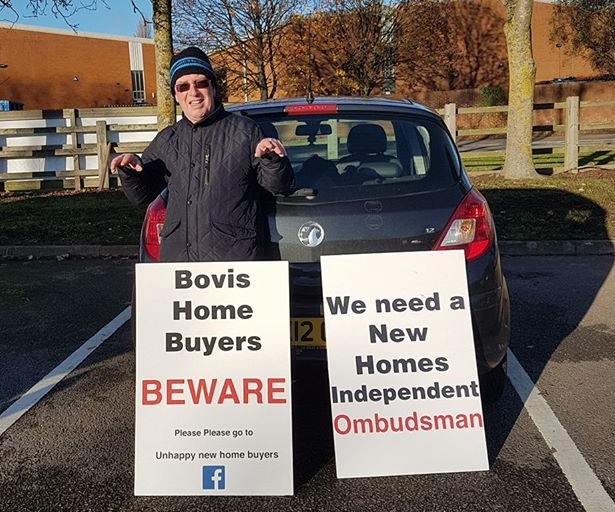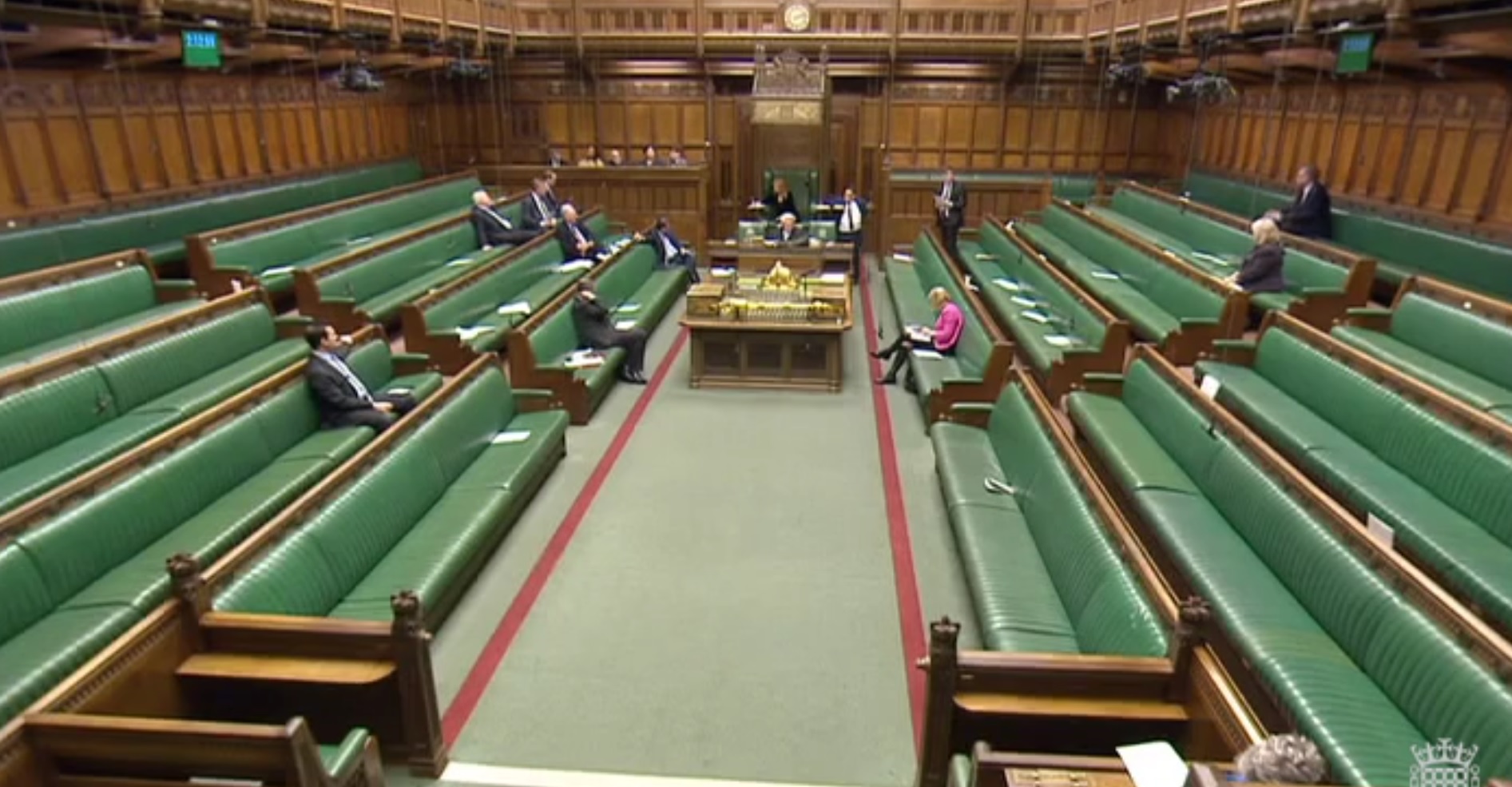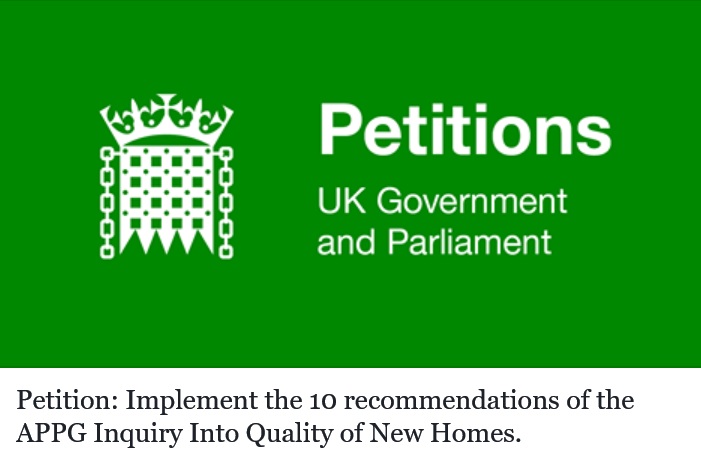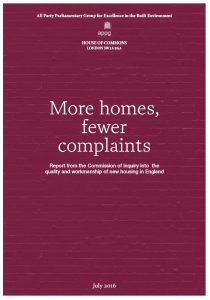The government has finally recognised the need for an independent New Homes Ombudsman and an APPG Inquiry is currently calling for evidence on how it would operate.
It is not impossible to build a defect-free new home. All that is required is the will to do so – building with care and with a thorough inspection regime that requires all sub-standard work to be taken down and re done. Yet 98% of new homebuyers report defects to their housebuilder within a few weeks.
For far too long the industry has used the “built in the open in all weathers” excuse and lowered buyers’ expectations. Bricklayers do not and cannot work in the rain! Render is not applied in the rain, yet there are many defects associated with both. Superstructure accounted for 38% of all NHBC warranty claims in the year to 31 March 2017, costing £35million (41% of total claims) to rectify. Adverse weather does not contribute to walls being built out of plumb, render cracking or missing insulation! All other trades (apart from groundworkers) work inside, often in the same conditions found in most factories.
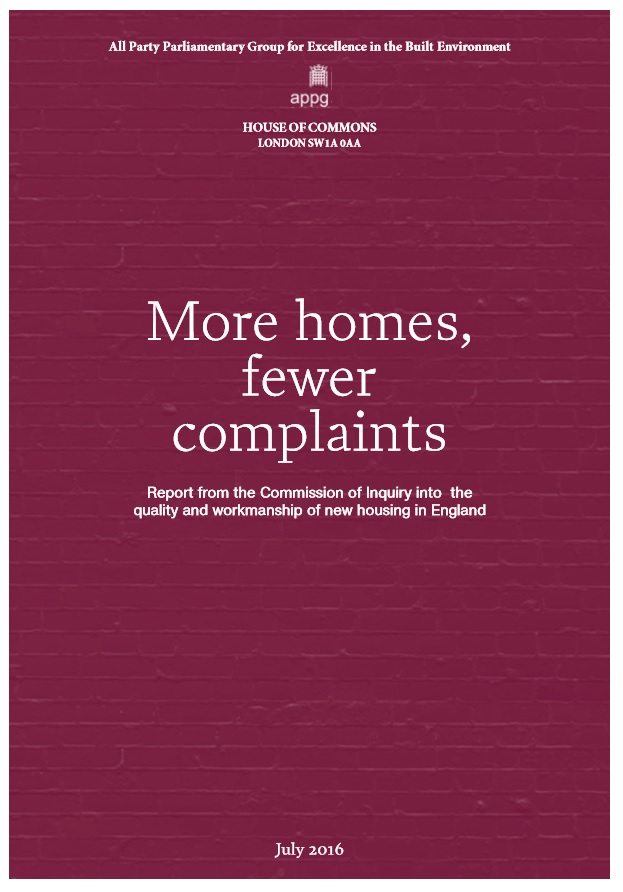 I suggested the need for an independent, government-appointed New Homes Ombudsman when I attended the second session of the APPG EBE Inquiry ‘Into the Quality of New Homes in England’ on 23rd November 2015.
I suggested the need for an independent, government-appointed New Homes Ombudsman when I attended the second session of the APPG EBE Inquiry ‘Into the Quality of New Homes in England’ on 23rd November 2015.
The APPG Inquiry Report, published on 13th July 2016, concluded:
- “Housebuilder’s own quality control systems are not fit for purpose”
- “there needs to be an industry aspiration to achieve a zero-defects culture”
- “good practice should be seen as building a new home that is defect-free”
It clearly stated the number 1 “key recommendation” – the Department for Communities and Local Government (DCLG) setting up a New Homes Ombudsman:
“The role would include mediating disputes between consumers and their builders or warranty providers to offer a quick resolution procedure paid for by a housebuilders’ levy.
We see this is as the key recommendation to provide more effective consumer redress, if things go wrong, and a good way of applying pressure on housebuilders and warranty providers to deliver a better quality service.
Our view is that the new service should be funded by a levy on the sector, but it would need to be completely independent and replace the dispute resolution service offered as part of the Consumer Code for Home Builders. Our recommendation picks up on one made by the Office of Fair Trading, in its 2008 market study into the house building industry, which suggested that, if the industry failed to make satisfactory progress, it would recommend further intervention in the form of a statutory redress mechanism for new homebuyers funded by a levy on the industry.”
So it is somewhat disappointing that, 18 months after the report was making the recommendation that an independent, government-appointed New Homes Ombudsman be set up to give buyers an independent form of redress, there has been so little progress. It is to be hoped that following this latest Inquiry, an independent New Homes Ombudsman will be set up by government without recourse to further delay, consultation, consideration, or review.
https://www.youtube.com/watch?v=QBhzPrDVTKo
“Too many new homebuyers are suffering, many are physically drained as a result of engagement with errant housebuilders when trying to get their new homes brought up to warranty standards and statutory regulations. For some buyers the mental anguish has become almost unbearable.” – Rob Wilson ex MP Reading East
 The housebuilders’ lobby group the Home Builders Federation (HBF), will no doubt tell this Inquiry that (according to the industry’s own customer satisfaction survey) “84% of new homebuyers are satisfied with their new home.” But as Communities Secretary, Rt Hon Sajid Javid alluded to in his speech at the NHBC on 29 November 2017:
The housebuilders’ lobby group the Home Builders Federation (HBF), will no doubt tell this Inquiry that (according to the industry’s own customer satisfaction survey) “84% of new homebuyers are satisfied with their new home.” But as Communities Secretary, Rt Hon Sajid Javid alluded to in his speech at the NHBC on 29 November 2017:
“too many new-build homes are simply not good enough.” You [HBF] can point to customer satisfaction levels of between 80 and 90%, something I’m often told about but [of new homebuyers] finding faults that take months and sometimes even years to remedy. It’s not just disappointing – it’s devastating. But just think about those 217,000 new homes built last year. Even if 80% of them have no issues, that still leaves well over 40,000 families living in accommodation that they don’t think is good enough.”
Indeed they do. The HBF frequently use the 84% “satisfaction” statistic. It is a fact that the HBF use their 8-week Customer Satisfaction Survey primarily to provide data to “rebut negative claims on build quality.” HBF Chair Stewart Baseley who says he is “a great believer in transparency and a great believer in people having access to services that are cheap for them to use to get qucik remedies to their problems” Nevertheless this survey is all we have at the moment. Far from “if 80% have no issues” as Javid assumes, the HBF survey actually demonstrates that 98% of new homebuyers report “problems” (in other words defects), to their housebuilder within a few weeks of moving in. Indeed 41% report more than 10 defects. The quality of new homes has further deteriorated. This is an undisputable fact, now even demonstrated by the industry’s dubious own customer satisfaction survey results 2017.
An ever growing number of new homebuyers have to move out of their new homes, often for several months, whilst their house is taken apart to rectify serious, often structural defects. More recently, there is a growing incidence of weak-mix mortar.
It is to be noted that the APPG Inquiry deadline for written submissions has recently been extended – the day after the BBC reported on the dire quality and defective new homes – from 22 December 2017 to 12 January 2018. It is hoped this is not to give the industry extra time to get its “ducks in a row.”
The current “procedures” limited as they are, serve to protect housebuilders and the warranty providers rather than help consumers. The only “alternative”, as has been written in many letters from various housing ministers and staff at the DCLG over the years, is for buyers to take action through the courts for monetary compensation.
As most buyers realise, even those with legal expenses insurance, this is a lengthy and costly process with no guarantee of a successful and fair outcome. Indeed, housebuilders have deep pockets and vigorously defend every attempt by the very few new homebuyers who courageously take this course of action. Housebuilders do this in the certain knowledge that it will cost them far less to defend the small number of claims that could potentially end up in court, than routinely pay justifiable compensation to homebuyers. Even if an agreement is reached ahead of a court hearing, this is normally subject to a non-disclosure agreement clause, (“gagging order”) to avoid any precedent being established and to reduce likelihood of action being taken by others, often with identical issues.
It is no longer a case of getting (all be it eventually) a few minor defects and snags rectified by the housebuilder being a satisfactory outcome. Now there is a clear case for justifiable compensation paid by housebuilders and/or warranty providers, to all buyers of sub-standard defect-ridden new homes.
A recent announcement by Communities Secretary Sajid Javid on 29 November 2017, mentioned “bold options” that the Government “will look at to improve consumer redress across the housing sector” – Setting up an independent New Homes Ombudsman should be its priority.
Worryingly, it would appear that it is the Government’s intention of rolling all existing ombudsman (Housing Ombudsman, the Property Ombudsman and Ombudsman Services’ Property, and the Property Redress scheme) into one, all-encompassing, ‘one-size-fits-all’ “Housing Ombudsman” rather than a simplified New Homes Ombudsman, purely for consumers that buy new homes. I firmly believe a separate, stand-alone, fit-for-purpose, independent New Homes Ombudsman is the only way that this industry will be forced to look inwards at what it does and make both the quality of new homes and customers, their number one priority.
As it stands, housebuilders are showing no intention of taking proactive measures to improve the quality of the new homes they build. Consumers need a fully independent means of redress. It is now essential to appoint a New Homes Ombudsman for the house building industry. All existing legislation to protect consumers, including The Consumer Rights Act 2015, does not apply to property.
During a debate in the House of Commons APPG EBE chair Jo Churchill said:
 “I applaud the Department for Communities and Local Government for getting the Home Builders Federation to look into the voluntary ombudsman scheme, but perhaps the time for any such voluntary scheme has passed.” Perhaps?
“I applaud the Department for Communities and Local Government for getting the Home Builders Federation to look into the voluntary ombudsman scheme, but perhaps the time for any such voluntary scheme has passed.” Perhaps?
“…the repointing of joints on walls where purposeful demolition and reconstruction should have happened” – No doubt in response to the growing incidence of weak-mix mortar.
“We must have not a nice, cosy, industry-led ombudsman, but an ombudsman process that has real teeth and the capacity to make a material difference” said Tony Lloyd MP for Rochdale
A New Homes Ombudsman, by its very existence would force housebuilders to look at what they do (and don’t do) forcing them to strive to do better, in the certain knowledge that a buyer can complain to an independent ombudsman who would potentially, be able to award unlimited, justifiable compensation. Such awards would become a matter of public record. No longer would housebuilders be able to delay and defeat buyers’ repeated attempts to have their defective new homes fixed.
New Homes Ombudsman: FREE – FAIR – FOR EVERYTHING
Free – At no cost to new homebuyers making a complaint following the housebuilder or warranty provider issuing a final deadlock letter.
Fair – A New Homes Ombudsman would (and must) be entirely independent of the housebuilding industry – something that clearly the warranty providers and the Consumer Code for Home Builders are most definitely not! Fully transparent, appointed and audited by Government.
For everything – Everything and anything that can and does arise when buying and living in a new home. Dealing with buyers’ complaints including misleading and incomplete marketing information and underhand selling practices, unfair contracts, poor build quality, defects, non-compliance with Building Regulations and/or warranty standards, inadequate or indifferent after sales service, conflicts of interest, tenure and boundary issues, contractual disputes – with the New Homes Ombudsman being able to order housebuilders and/or new home warranty providers to pay buyers justifiable and meaningful compensation awards.
The New Homes Ombudsman must be fully-independent and government-appointed, NOT one of many “Ombudsman” in the Ombudsman-services.org who act as little more than an outsourced dispute resolution service to various sectors. Cost Effective Dispute Resolution (CEDR) is not going to work either!
But the New Homes Ombudsman should not be part of a wider, ‘one-size-fits-all’ one-stop, general purpose “Housing Ombudsman” as the current rhetoric from Government would indicate. I was horrified that merging the various existing residential Ombudsman into one “Housing Ombudsman” is being given serious consideration even though it would also include a mechanism of independent redress for new homebuyers for the first time. Whilst this is better than the complete absence of any independent means of redress that new homebuyers currently have, it would not be in the best interests of new homebuyers if the badly needed New Homes Ombudsman was set up as part of a wider “Housing Ombudsman” service.
It would take a considerable amount of time and presumably new legislation to combine the existing ombudsmen into one office. Furthermore, the new-build industry is sufficiently large and errant to fully justify a dedicated New Homes Ombudsman of its own – which would specialise in the many unique issues and technicalities of the new-build sector. Camouflaging a New Homes Ombudsman under the umbrella of a general “Housing Ombudsman” would also make the New Homes Ombudsman less conspicuous to the very people who would need and benefit from it.
Housebuilders and warranty providers operational basis is to ‘bat away’ buyers’ complaints and warranty claims rather than work in the consumer’s best interests. Despite many years of opportunity, this isn’t going to change. It is now time, as I would hope this Inquiry will conclude, that UK new homebuyers were given something from this government. A small concession that if (or rather when) they are unfortunate enough to discover major, preventable defects in their new home, or housebuilders fail to rectify defects in a timely manner, they can apply to an independent, government-appointed New Homes Ombudsman who could award justifiable and meaningful levels of compensation.
As Communities Secretary Sajid Javid MP announced on 29 November 2017 recognising the need for an Ombudsman to give new homebuyers a form of redress, I would hope, following the recommendations and evidence I have submitted to this Inquiry, he will announce that a stand-alone independent New Homes Ombudsman will be now be set up by the end of 2018.
In the past, government ministers and the DCLG have been hoodwinked into believing that the industry’s own voluntary Code, the new home warranty and the building regulations offer sufficient protection for new homebuyers. Government also believed that consumers are “more likely to be supported by independent professional advice from lawyers and others capable of giving advice top their clients and because the terms of the contract are more likely to be negotiated.” and “they can take action through the courts for monetary compensation.”
However, despite the obvious need and benefits a New Homes Ombudsman would give consumers, many within the industry, will maintain that a fully independent New Homes Ombudsman is not necessary. Their lobbyists, the Home Builders Federation (HBF) claim “the overall quality of new homes has never been higher than it is today” stating that “the overwhelming majority of people are happy with their new homes. In the small number of cases where buyers encounter problems the industry is fully committed to completing them as soon as practically possible.”
This is quite simply, not the case.


